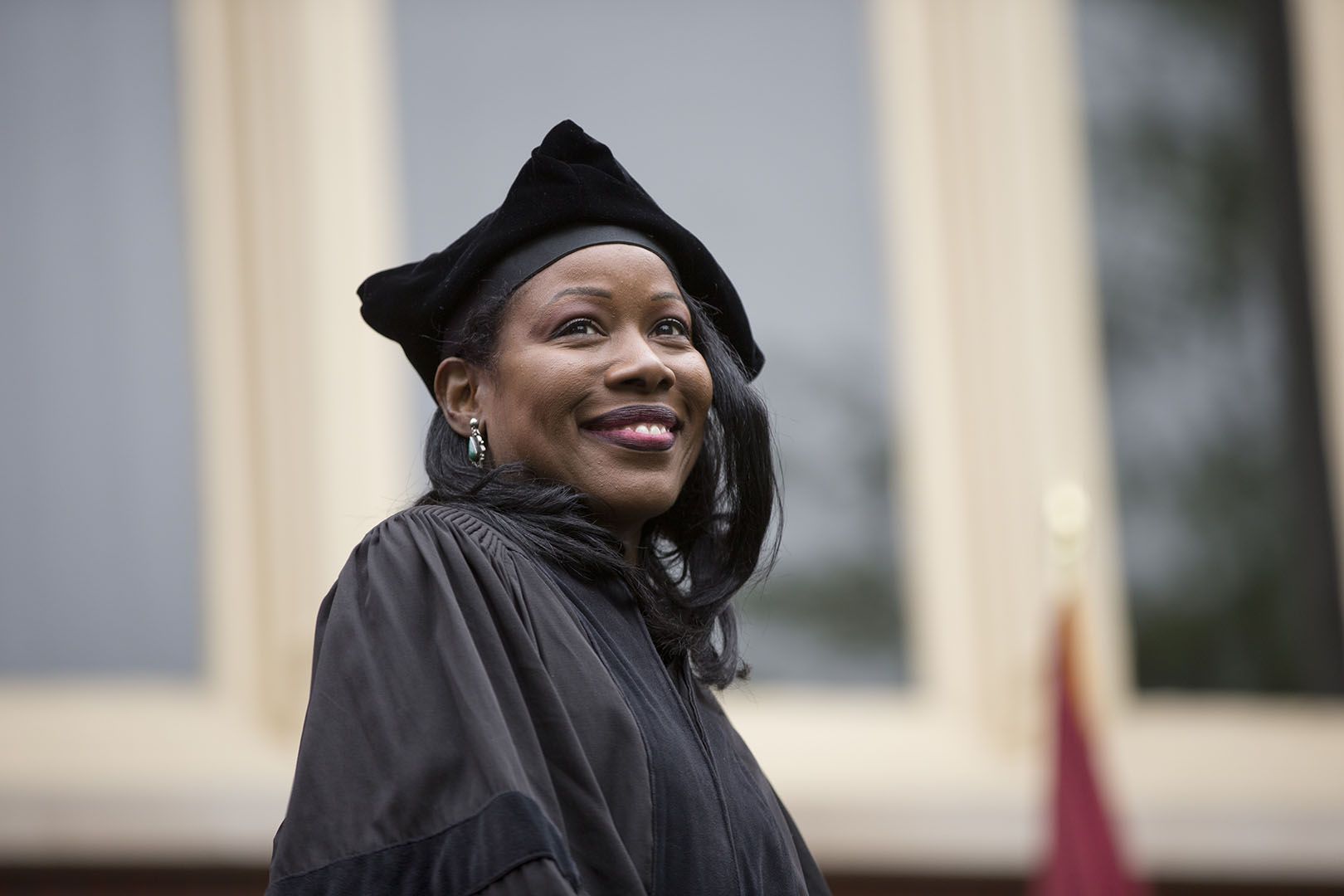Daunting challenges for the world and America tend to emerge when one looks at Bates Commencement speeches from the past half-century. Themes around the environment, the economy, social justice, and war, for example.
But there are comforting themes, too, like our capacity for kindness, love, and optimism. And, yes, the idea that Commencement is a time for simple congratulations. As Robert De Niro said in 2013, “This isn’t an occasion for me to urge you on a path you have already chosen. This isn’t a day for advice; this is a day for pats on the back.”
1971: ‘All Americans Will Lose Some of Their Liberties’ — Coretta Scott King, civil rights advocate, author, and widow of Martin Luther King Jr.
While I sharply disagree with the politics of Miss [Angela] Davis, I must say that if her Blackness, her politics, and her womanhood are being judged, and not the crime, then all Americans will lose some of their liberties along with her.
King was addressing the jailing of activist and scholar Angela Davis in 1971 for her role in the armed takeover of a courtroom in Marin County, Calif.
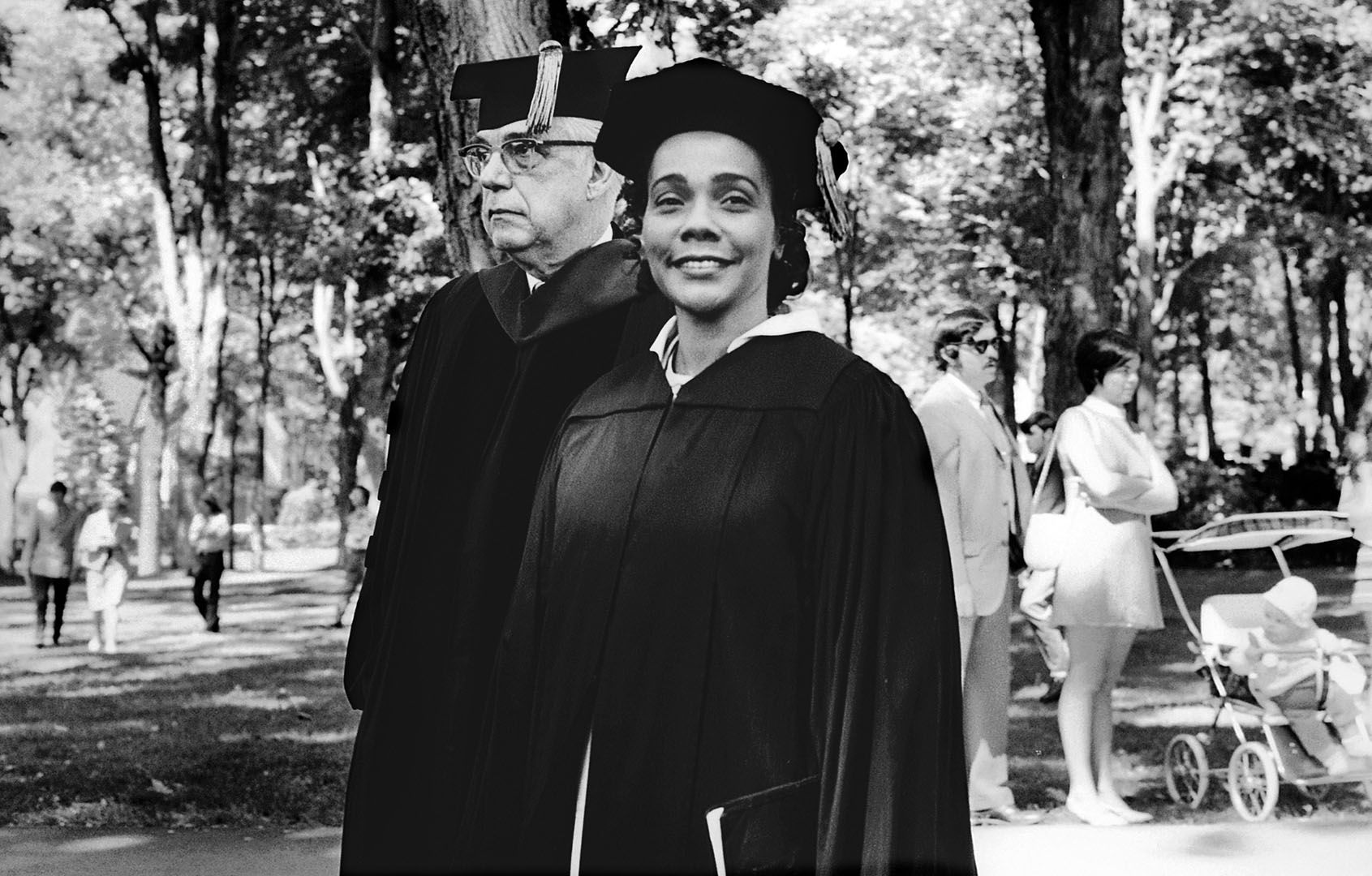
Coretta Scott King marches in the 1971 academic procession at Commencement. (Muskie Archives and Special Collections Library)
1978: ‘Serial, Kaleidoscopic Exposure’ — Robert MacNeil, journalist
The trouble with having been born into the mass media age — the television age — is that it discourages concentration. It encourages serial, kaleidoscopic exposure. It diminishes your attention span, reduces it to that a small child. Its variety becomes a narcotic, not a stimulus. You consume not what you choose and when, but when they choose — and what.
1982: ‘The First and Only Black Woman’ — Charlayne Hunter-Gault, PBS journalist
When I entered the University of Georgia, it was not because the admissions committee had reviewed my application and realized that I was third in my class of 160, had scored decently on the SATs, had been in the honor society, editor of the school paper, and a host of other things that made me desirable college material.
It was because a federal judge had reviewed not only my application, but had reviewed the university’s behavior to it and came to the conclusion that the only reason I had been denied admission was because of the color of my skin. And then he ordered me in — the first and only black woman in the entire school of 20,000 students.
The students — not all, to be sure, but enough — greeted me in a mob, attacked the dormitory where I had just begun to unpack my clothes, hurled bricks and bottles through the window — some of the shattered glass flew into my suitcase, showering my skirts and blouses with debris — and shouted threats late in the night, demanding on the one hand that I leave immediately, but insisting on the other that they would kill me if I showed my face.
1994: ‘Being Blacker than Thou’ — Henry Louis Gates, literary critic, historian, and Harvard University professor
At Yale, I was secretary of our political organization called the Black Student Alliance at Yale — BSAY — and I remember my first year there, attending my first meeting of this political group.
And most of all, I remember the trepidation that I experienced as a transplant from the back hills of Appalachia in the company of these largely urban black people. Black and smart, and elegant, and from elsewhere, as we’d say in the valley where I grew up. A group with a definite sense of what was and what was not authentically black, jockeying for position by being blacker than thou…
Filing out, I asked a friend, a man named Linwood from North Carolina, whether he found it hard to fit into this meeting. And I’ll always remember his response to me. “Skip,” he said to me, shaking his head sadly at all the posturing that had been going on, “I’ve been black my whole life.”
It was as if a load had been lifted from me. Or, as Benjamin Mays put it, put this realization so well in 1970, “I’m glad that I didn’t have to wait 70 years for someone in the 1960s to teach me to appreciate what I am: black.”
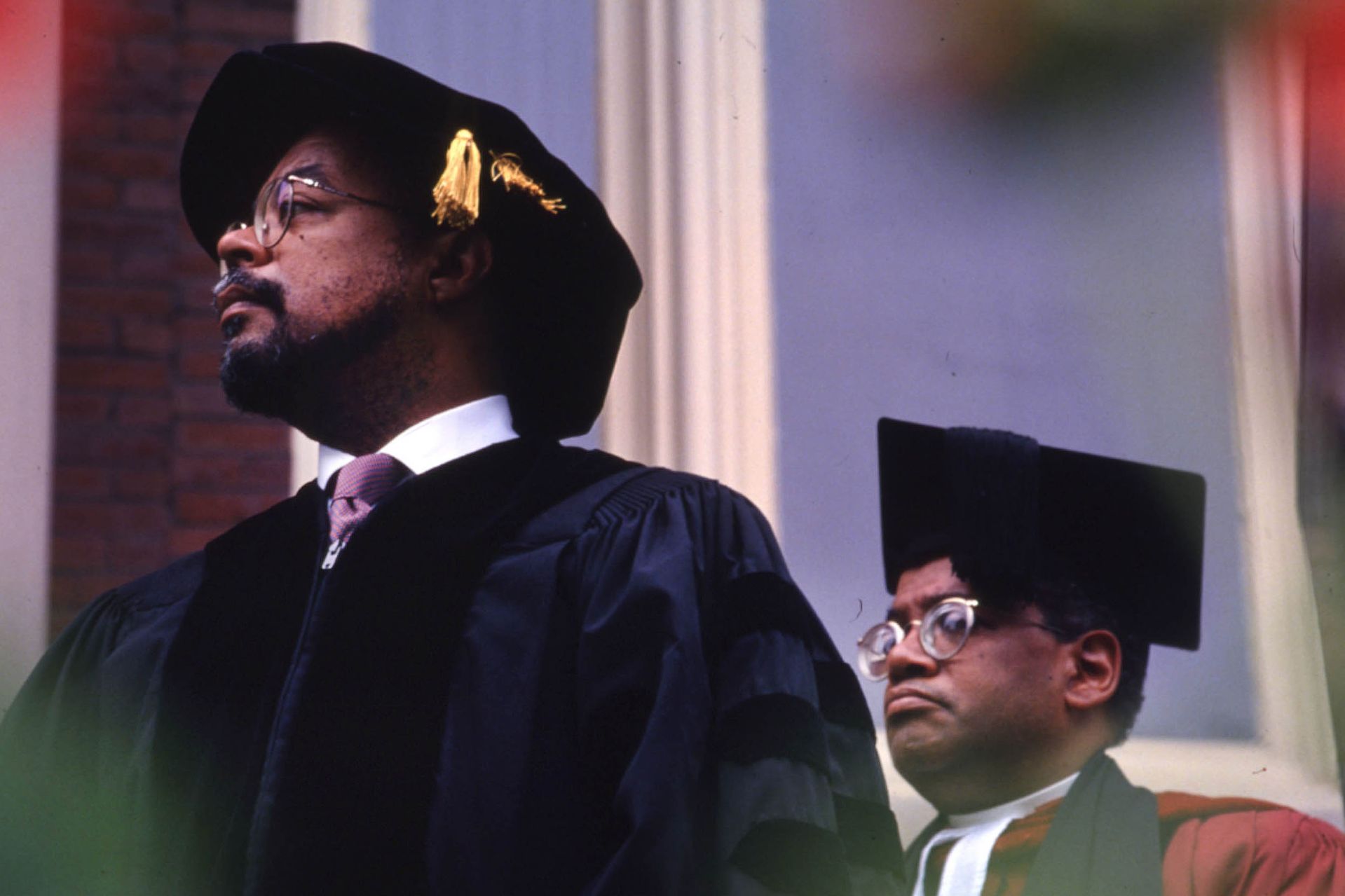
Henry Louis Gates listens to his honorary degree citation at Commencement 1994. At right is the late Rev. Peter Gomes ’65, Pusey Minister in the Memorial Church at Harvard. (David Wilkinson for Bates College)
1995: ‘The Best-Educated Electorate’ — Garry Wills, author, journalist, and historian, and 1993 Pulitzer Prize winner
Our politics is now described as snarled, orchestrated by people like Rush Limbaugh. But ours is, after all, the best-educated electorate and the best-informed one in history. Our journalism is the most accurate and self-correcting that ever existed.
1967: ‘Reject the Glorified Pragmatists’ — Margaret Chase Smith, U.S. senator from Maine
If our nation is to maintain the moral fiber that is necessary to the survival of our way of life, then we must reject the glorified pragmatists who advocate cutting corners, who preach the propaganda of expecting “something for nothing,” who espouse the doctrine that the “end justifies the means,” and who caution against “getting involved on matters of principle.”
2013: ‘We Will Be Loving’ — Tommy Holmberg ’13, first student speaker at Commencement
You see, it’s a beautiful cycle we’ve got here. The goodness of Bates is passed on out of admiration and gratitude for what was, and excitement and pride for what will be.
[As graduates] we will be intelligent, because of the ardor and devotion of the good people of this institution. We will be passionate, because Bates allowed us to follow our passions and realize our dreams. We will be fun, because we’ve had fun here. We will be loving, because the Bates community showed us so much love.
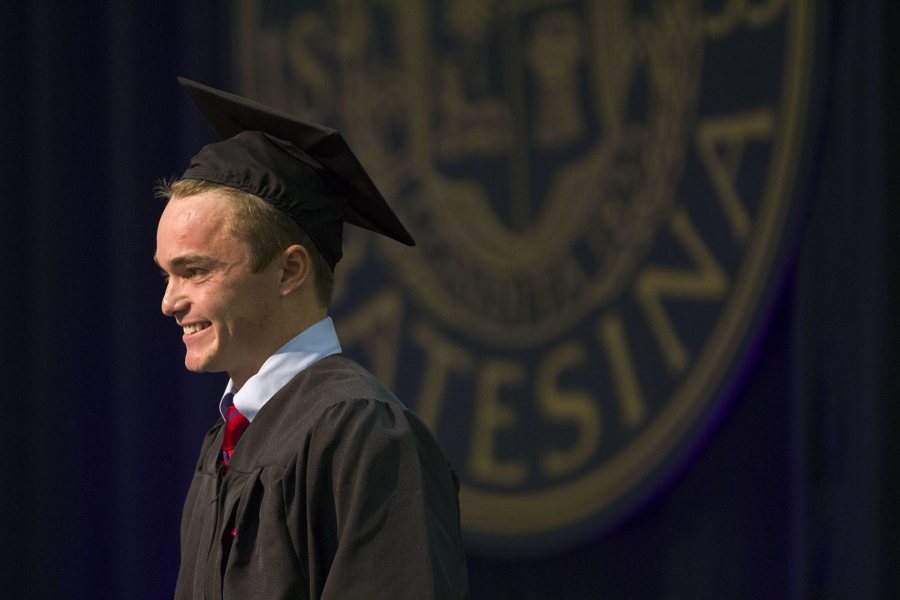
Tommy Holmberg ’13 delivers the student address at Commencement on May 26, 2013. (Phyllis Graber Jensen/Bates College)
1996: Chinua Achebe, Nigerian novelist, poet, professor, and critic
No one is, or should be, so naive as to believe that all the problems of the world will be solved by goodwill and civility alone. Indeed it may well be true that the road to hell is often paved with good intentions. But it is at the same time inconceivable that the road to the other place will be paved with bad intentions.
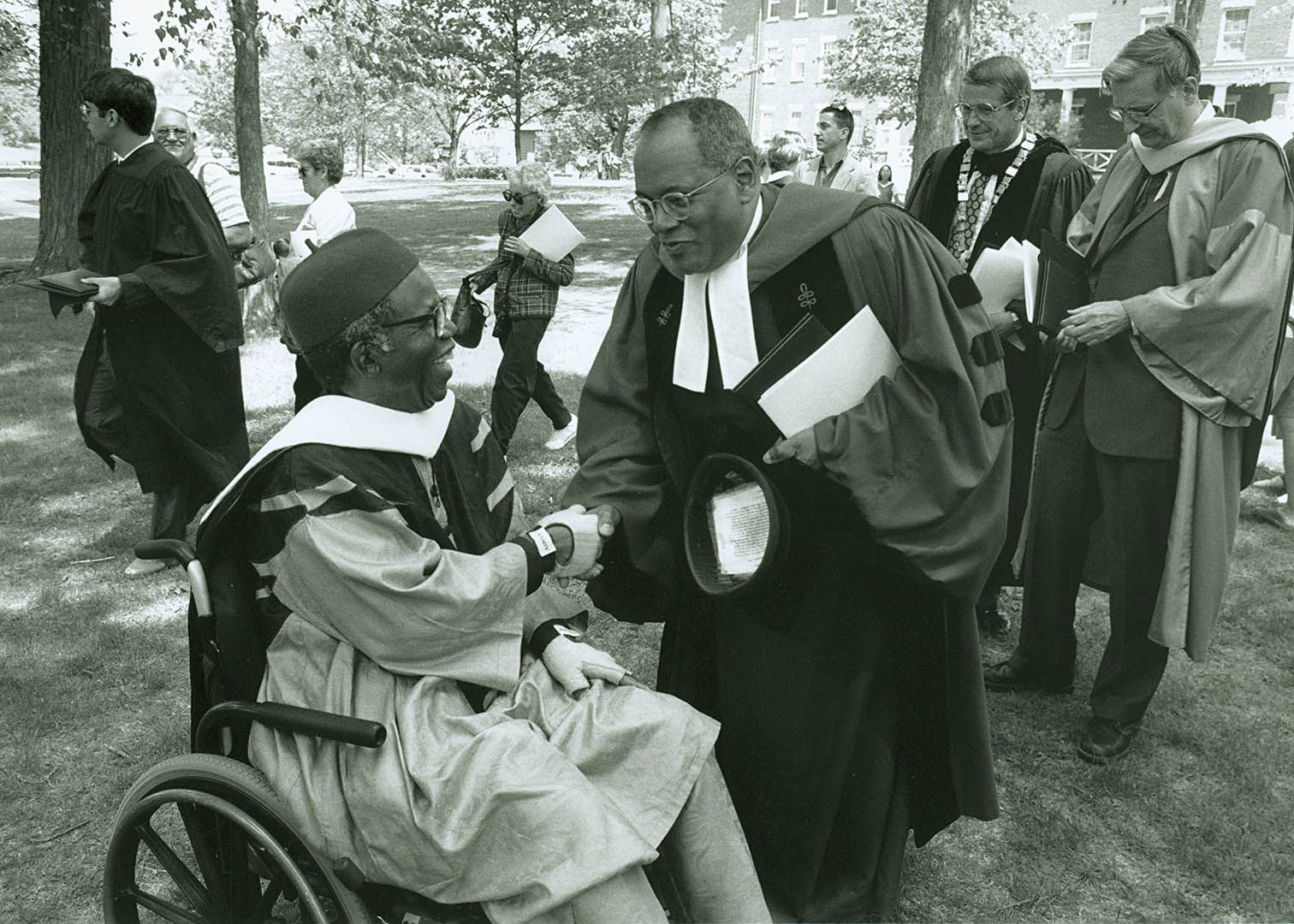
Commencement speaker Chinua Achebe greets Peter Gomes ’65 following the 1996 ceremony. At right are President Donald Harward and famed ornithologist Edmund Wilson. (Marc Glass ’88/Bates College)
1991: ‘Science as Organized Unpredictability’ — Freeman Dyson, theoretical physicist and mathematician
It used to be said that science was organized common sense. In the modern times, it would be more accurate to define science as organized unpredictability. So the great task before us now, as citizens of the world, is to learn to organize our societies in such a way that unpredictable things have a chance to happen.
A number of revolutions in our thinking are long overdue [but] if you believe your lives are predictable, you lose your task to be leaders of revolutions. It is your chance, both in science and in society at large, to prove the conventional wisdom wrong, and to make your unpredictable dreams come true.
2010: ‘Life Is Too Interesting to Miss’ — Elizabeth Strout ’77, Pulitzer Prize-winning novelist
My college roommate and I, when we lived together in Hacker House sophomore year, used to wash our faces at night in the bathroom and discuss everything that happened during the day. I can’t remember how many times she said to me, “Well, Strout, no matter what: You gotta admit, life is too interesting to miss.” And she was right: It really is.
2000: ‘The Ethic of Family Is a Radical Ethic’ — Desmond Tutu, South African cleric and theologian, and anti-apartheid and human rights activist
The ethic of family is a radical ethic. In the family that you come from, you don’t say, “Oh, dear Granny: The contribution that you are making to the budget is minimal.” “Baby: You are a nuisance most of the time; you make very little contribution to the family budget. You will get from the resources of the family in proportion to what you put in.”
You never say that! You don’t say about family that you get only in proportion to what you contribute. No! In the healthy family, it is from each according to their ability; to each according to their need.
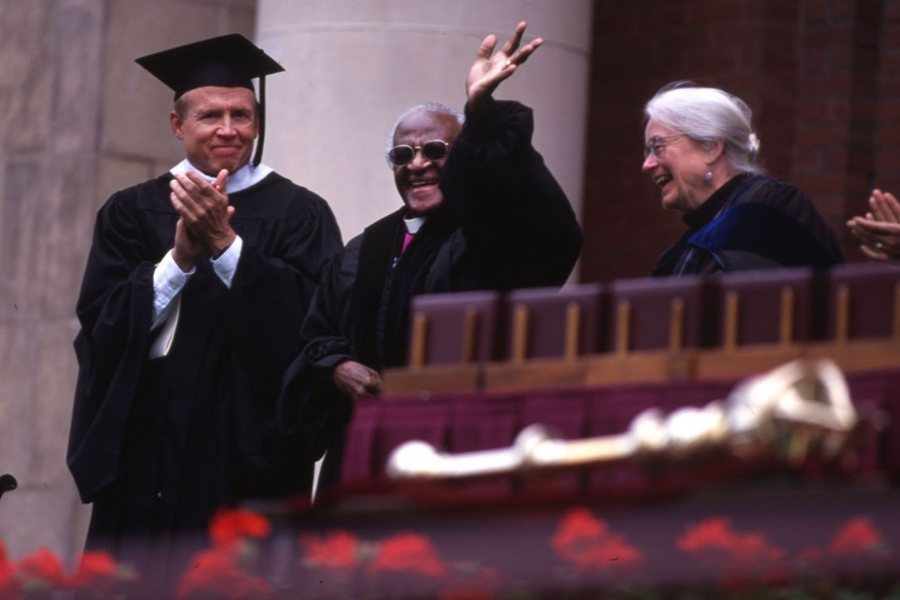
Desmond Tutu waves to the Commencement audience. At left and right are then-trustees Colin Fuller ’69 and Trish Morse ’60. (Phyllis Graber Jensen/Bates College)
2006: ‘Bates College Too Is the Real World’ — author and historian David McCullough
Choose work you love. Work hard. Take your work seriously, not yourself. Don’t let setbacks or skeptics get you down. And when, as is bound to happen, some supposedly all-knowing somebody says to you, “Well, welcome to the real world,” remember that Bates College too is the real world. Remember that Shakespeare, and Cervantes, Botticelli and Tchaikovsky are the real world.
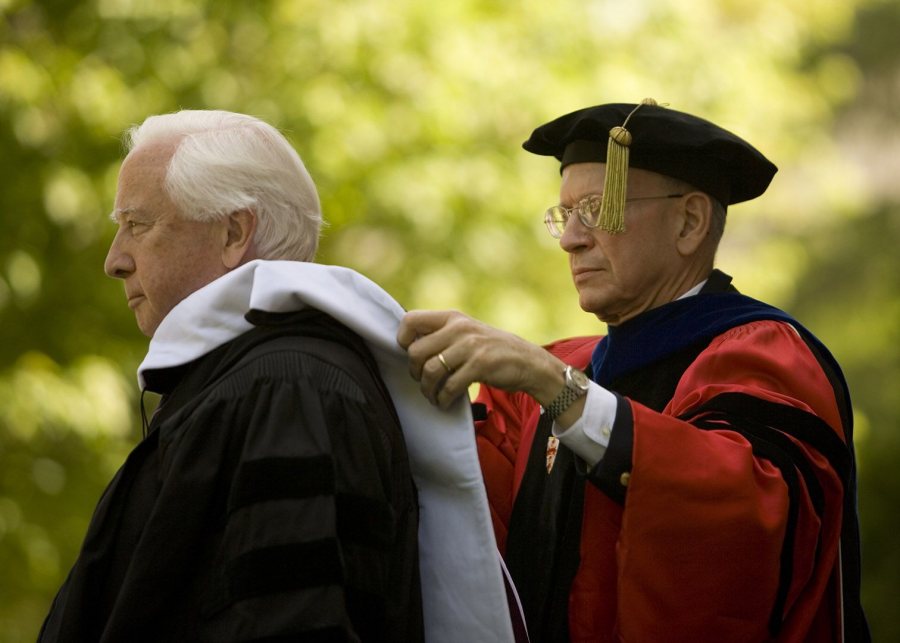
Historian David McCullough receives his honorary degree hood from Professor of Sociology Sawyer Sylvester in 2006. (Phyllis Graber Jensen/Bates College)
1987: ‘Charter for Change’ — Ellen Ash Peters, chief justice of the Connecticut Supreme Court
A liberal education, like our Constitution, is a charter for change. You, too, have been given by your years at Bates a structure of learning and a core of values, and you, too, have ahead of you a lifetime of interpreting experience and knowledge and art. That is a difficult enterprise, but I commend you, in Yeats’ phrase, to “the fascination of what’s difficult.”
2016: ‘I Feel Blessed’ — U.S. Rep. and civil rights icon John Lewis
I feel more than honored, I feel more than lucky, I feel blessed to be standing here on this campus to speak to you, the graduates, where a man by the name of Benjamin Mays once stood. Many, many years ago I got to know Dr. Mays. He was part of my inspiration, he was my friend, my leader.
1966: ‘Art Is No Escape’ — William Schuman, composer
If each of you has not seen to his own exposure to the riches of the arts, then each of you had better do something about it, and immediately…. If you think that I am suggesting this to you because art is an escape, you are absolutely wrong.
Art is no escape. Art is heightened experience. Art is a distilled, highly concentrated presentation of the human intellect, spirit and heart — presented through creators and performers in such a way that it engages you in a manner that is unparalleled in any other form of human connection.
2004: ‘Keep in Touch’ — longtime Dean of Admission Milt Lindholm ’35
Cherish the memories of the four years that you have been here. Come back as often as you can. Rejoice in the friendships you have made. Keep in touch.
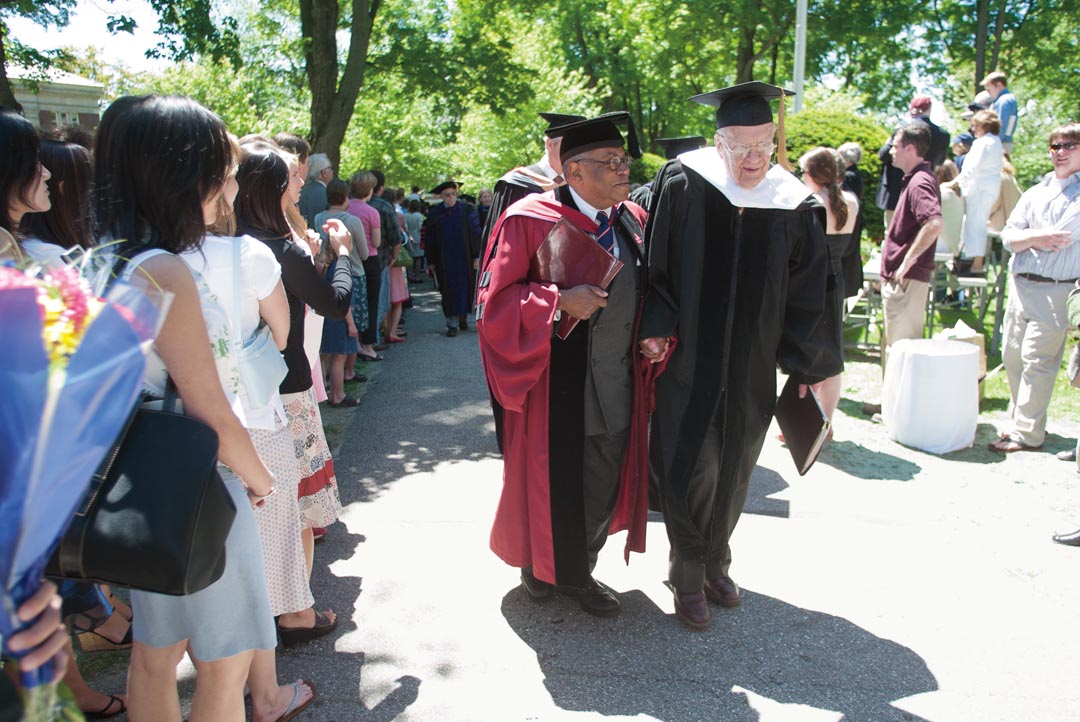
Milton Lindholm ’35, who spoke and received an honorary degree in 2004, walks hand in hand with his close friend, Peter Gomes ’65, as the ceremony ends. (Phyllis Graber Jensen/Bates College)
1990: ‘Harder than Reading a Benetton Ad’ — Catharine Stimpson, feminist scholar and later director of the MacArthur Fellows Program
Being a cultural democrat, living with cultural differences, can be exhausting. It demands pragmatism and patience, courage and civility. It is much harder than adding a book or two to a general education course; much harder than ordering an ethnic item from a mail-order catalogue; much harder than reading a Benetton ad.
1981: ‘The Way You Feel Things Ought to Be’ — former Deputy Secretary of State and future Secretary of State Warren Christopher
The campus traditionally has been a place where policies are measured not simply on the basis of what is effective, but also what is just; not only what is expedient, but also what is right. What I ask is that you bring those measurements along as you embark on the next stage in your lives; that instead of molding yourself too much to fit the way things are, you strive to shape your next environment to the way you feel things ought to be.
2009: ‘We Can All Describe the Problems We Face, But…’ — Fareed Zakaria, journalist and author
In the 1760s, an English clerk, Thomas Malthus, predicted that England would run out of food…. Malthus was entirely right in describing the problem. He did not understand the human response. England invented an agricultural revolution, then an industrial revolution, went on not simply to feed its people but a large part of the world.
If you look at the current economic crisis, we can all describe all the problems we face. But it is very difficult to know what you will do in response to it. What we will do in response to it. What government will do, what industry will do, what nonprofit organizations will do, and how the collective human response will thus change history.
https://youtu.be/aCKQcxdyhm4
2007: ‘My Jumping-off Place’ — Corey Harris ‘91, musician and MacArthur ‘genius grant’ recipient
You can box off a place, count off the people, and say, “You’re the minority.” But if you’re looking at the whole planet, I don’t like to talk in those terms. And I feel that Bates really helped me to expand my view of the world.
It was at Bates that I got to interact with people I never thought I’d interact with: people from Africa, people from the Caribbean, people from East Asia, from West Asia, from all over the world. This was my jumping-off point to discover the world.
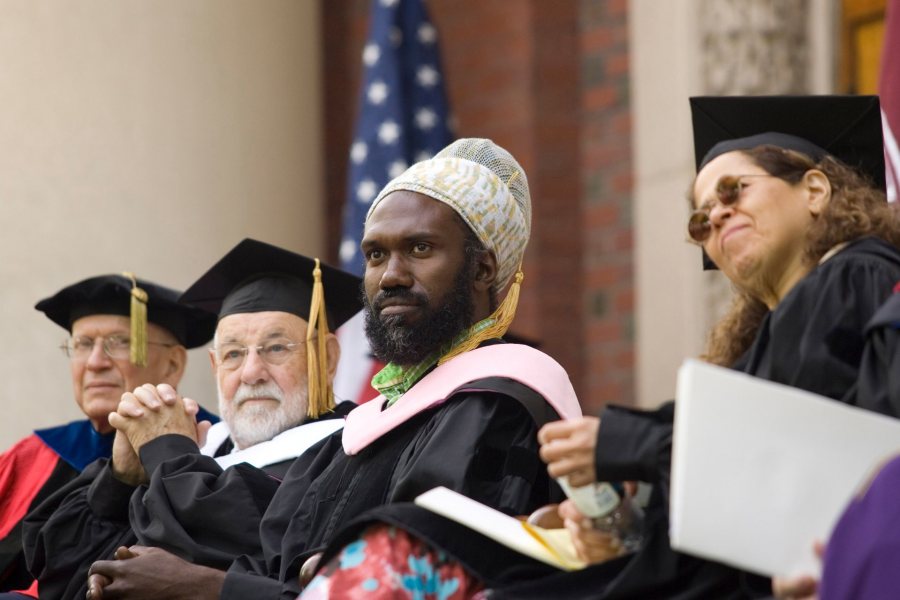
At Commencement 2007, Corey Harris ’91 listens to the proceedings at center. From left are Professor of Sociology Sawyer Sylvester, children’s book author Eric Carle, and actor and author Anna Deavere Smith. (Phyllis Graber Jensen/Bates College)
1998: ‘History Held a Magic for Me as a Child’ — Doris Kearns Goodwin, historian
I can still remember as if it were yesterday sitting on our porch when I was 6 years old, waiting for my father to return from work so I could share with him the results of that day’s Brooklyn Dodger game which I had preserved play by play, inning by inning in the red scorebook he had given me for my sixth birthday.
There, no doubt, my love of history was planted in the nightly sessions when my father sat by my side in seemingly rapt attention as I recounted in excruciating detail the entire history of that afternoon’s game. (In fact, for years, my father never told me that all this was described in the newspapers the next day, so I thought without me he would never know what had happened to our beloved Brooklyn Dodgers.) Little wonder that history held a magic for me as a child which it continues to hold to this day.
2012: ‘I Still Got It’ — Robert De Niro, actor
I want you to know under this movie-star exterior is a real person. Just like you. — Naw, I really didn’t mean that. That was acting. You see, I still got it….
Thinking about and actually doing the right thing is a cliché, but so what? It’s also the worthiest of goals. When a director gives you a line reading that doesn’t feel right for your character, nod and agree with him or her, then do it the way you know your character would do it. If you’re an actor, always be true to your character; if you’re not an actor, have character, and always be true to yourself.
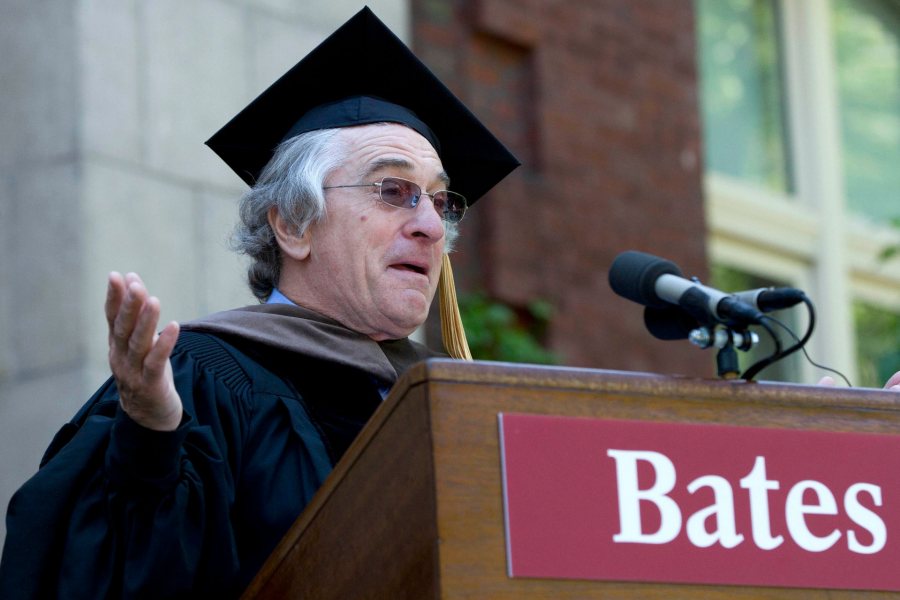
With a classic expression, actor Robert De Niro cracks up the Commencement audience in May 27, 2012. (Phyllis Graber Jensen/Bates College)
2001: ‘That Character Wall’ — Robert Reich, author and former U.S. Secretary of Labor
Knowledge is not enough. You’ll also need some wisdom. Wisdom involves self-knowledge…. In order to make wise choices about your life’s work, you’ll need to know something of who you are, and be able to imagine the kind of person you want to be. Gaining self-knowledge often comes from failing, crashing headlong into the walls of your character.
And have no doubt about it: You will fail. In some way, at some time, you will fail. In fact, you will keep crashing into that character wall again and again until you finally realize it’s there. And that you’ve either got to knock it down, or figure out how to get over it.
1968: ‘A Measure of Humility’ — Nils Wessell, former President of Tufts University
A sense of community, glibly talked about but rarely achieved, is and should be our aspiration. Such a sense of community is achieved in the derivation of common goals and through a free and honest interplay of ideas, whether originated by student or alumnus or teacher or administrator, when respect for the opinions of others is coupled with a measure of humility regarding one’s own competence and insight.
2012: ‘Look Up and Away from the Fear’ — Gwen Ifill, PBS journalist
I’m going to give you some advice, and it’s fairly simple piece of advice, and it is this: Look up. We’re all looking down. We’re all looking down as we walk, as we talk, as we text. How many of you are tweeting about this right now? Look up! Pay attention to what’s going on up here!
It’s so much simpler to look down. Your feet are down there, our screens are down there. But our fears are down there too. If you look up and away from the fear you will see the destinations you are headed toward, and you will see the opportunities.
If you look up, you will see the chance to speak and to act on behalf of the discouraged and the diminished. If you look up you will see the expectation you set for yourself can only be expectations that we are setting for you today.
If you look up, you will realize you have a responsibility to build a set of steps for those following behind you to climb up. If you look up you will see that a Bates degree is the beginning of your life’s education but not the end.
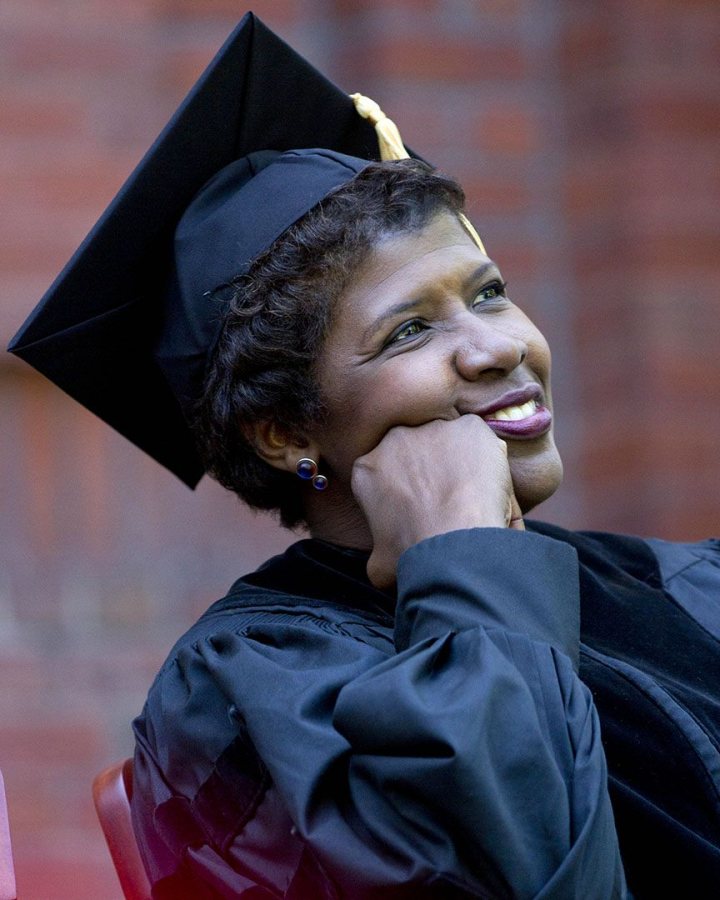
Gwen Ifill listens to a fellow 2012 Commencement speaker. For several years, all the honorary degree recipients would address the gathering. Ifill was joined by actor Robert De Niro and biologist Bonnie Bassler. (Phyllis Graber Jensen/Bates College)
1970: ‘Prerequisites to Human Fulfillment’ — Russell Train, administrator of the Environmental Protection Agency
The need for diversity is another of evolution’s great lessons. Diversity is critical to further evolution and to survival. Change and, thus, progress can only occur through a process of selection. Selection requires both choice and the freedom to make choice….
Diversity and freedom are, therefore, prerequisites to human fulfillment. Limitations on diversity — whether ecological, political, or social — are harmful and, indeed, destructive of the potential of our spoils. Can we doubt that cultural uniformity leads to cultural vulnerability?
1966: ‘Fight the Battles of the Disinherited’ — William H. Hastie, first African American federal judge
Until we have close human association with people who have problems different from our own and whose outlook on life is colored by a different body of experiences, we don’t know the American scene.
2014: ‘The Very Word of God Was Segregated — Isabel Alexis Wilkerson, historian and author
When your grandparents (and for some of you when your parents) were born, it was actually against the law for a black person and a white person to merely play checkers together in Birmingham. You could go to jail if you were caught playing checkers with a person of a different race.
It was against the law for a black person to take out a library book in Mississippi; in living memory, throughout the South, there was actually a black Bible and an altogether separate white Bible to swear to tell the truth on in court. The very word of God was segregated. Throughout the South, black people were publicly executed for trying to vote and white people killed for trying to help them.
